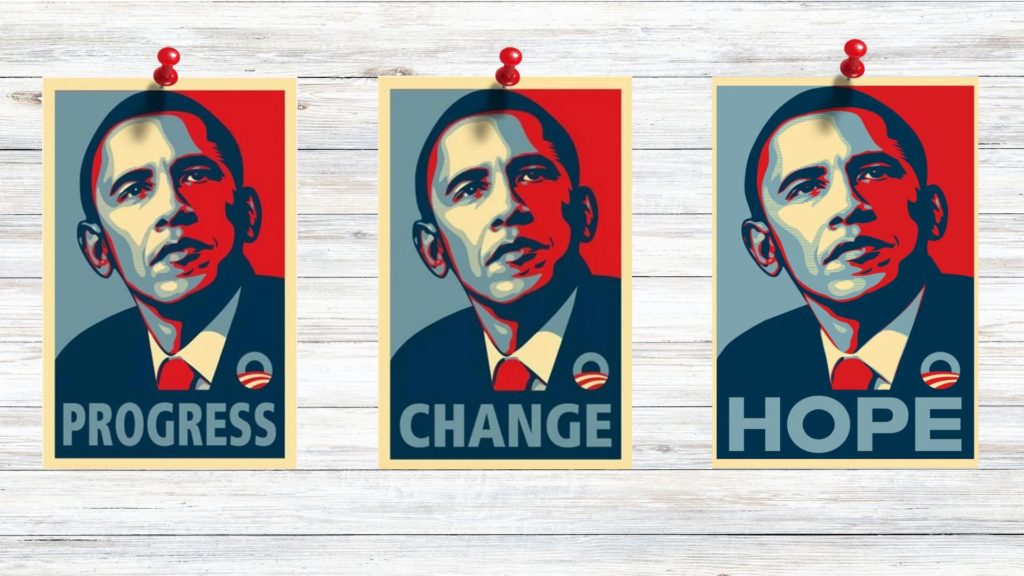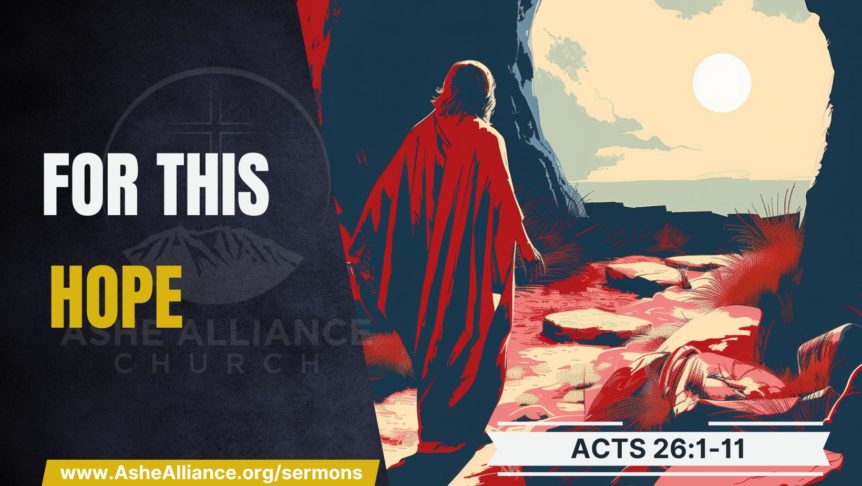LISTEN
WATCH
Nate Roten / Acts Series / Acts 26:1–11
Main Idea
Biblical hope is built on the trustworthiness of God to keep His promises.
2008 would prove to be a historic presidential election. The battle for the presidency would be between Barack Obama and John McCain. As the campaign trail blazed on, artist Shepherd Fairey created a stencil drawing of Barack, pulling inspiration from portraits of JFK and even Lincoln from the $5 bill to create the iconic image that would become the campaign poster for the Obama administration. Three versions of it were publicized. Each of the three had the same image (ironically taken from a copyrighted photograph taken by a freelance photographer from the Associated Press that ended up in litigation, but that is a story for another time) but had a different word at the bottom.
One had PROGRESS, another had CHANGE, but the most prominent and popular was the one that said HOPE.

This poster inspired thousands (if not millions) to cast their vote for Obama in hopes that he would change the trajectory of the nation, their fortunes, etc…
And that is what hope does, right? Hope inspires, helps us endure, and can lift our spirits to persevere for a better tomorrow. However, this slogan was confusing to me at the time because I didn’t know what it meant. I know what the word means, but without context for what that hope was for, it only seemed to be an emotional response to an ambiguous desire for an undefined future. I wanted to ask: Hope in what? Hope toward what end?
What is hope?
Holman Illustrated Bible Dictionary Hope
HOPE: Trustful expectation
From a worldly perspective, hope is the wishful expectation that what you want will eventually happen.
It can look like a desire you want to be fulfilled, that an expectation will be met, confidence in a person who will effect the change you want, or an idealized future that is better than the present.
That poster capitalized on the emotional tie to hope. People wanted more than what they had. Many didn’t like the current president, so they hoped that Obama would take the nation in the direction they wanted. Many wanted the racial diversity he would bring to the White House as the first African American president. Others latched onto the emotional charge that change would bring (despite knowing what ‘change’ really means). But again, that rallying cry was arbitrary. Many would cry for change, putting hope in a person without knowing what idealized future he would create.
As we will see today, HOPE for the Christian is packed to the rim with real meaning and substance crucial to our way of living, so let’s jump in.
Passage
Acts 26:1–11 ESV
So Agrippa said to Paul, “You have permission to speak for yourself.” Then Paul stretched out his hand and made his defense:
“I consider myself fortunate that it is before you, King Agrippa, I am going to make my defense today against all the accusations of the Jews, especially because you are familiar with all the customs and controversies of the Jews. Therefore I beg you to listen to me patiently.
“My manner of life from my youth, spent from the beginning among my own nation and in Jerusalem, is known by all the Jews. They have known for a long time, if they are willing to testify, that according to the strictest party of our religion I have lived as a Pharisee. And now I stand here on trial because of my hope in the promise made by God to our fathers, to which our twelve tribes hope to attain, as they earnestly worship night and day. And for this hope I am accused by Jews, O king! Why is it thought incredible by any of you that God raises the dead?
“I myself was convinced that I ought to do many things in opposing the name of Jesus of Nazareth. And I did so in Jerusalem. I not only locked up many of the saints in prison after receiving authority from the chief priests, but when they were put to death I cast my vote against them. And I punished them often in all the synagogues and tried to make them blaspheme, and in raging fury against them I persecuted them even to foreign cities.
Addressing the King vv.1-3
• Paul’s posture as an orator. He demonstrates that he is a professional and is taking this opportunity seriously.
• Paul’s respectful address to King Agrippa. The Greek word used here in the ESV as “fortunate” is the same word used repeatedly by Jesus in the Beatitudes, translated as “blessed.” This isn’t pandering like Tertullus did. Paul knows King Agrippa II comes from Jewish roots and understands Jewish culture and theology. This genuinely expresses how he will benefit from Agrippa hearing his case.
• “I beg you to hear me patiently.” Paul implores Agrippa to be attentive and to focus with patience, which implies that there is essential information he won’t want to miss… which is true because it is the gospel! Luke provides the most detailed exposition of Paul’s conversion experience, and because space on parchment was valuable real estate in the 1st century, Luke also deems this monumentally important.
How Paul was known vv.4-5
“I am known by my manner of life.” – Paul had a reputation in town and abroad (likely in Cilicia). He was brilliant in matters of the Law. He was trained under the brightest mind in Jerusalem (Gamaliel). He was zealous for Jewish theology. He even had dealings with the Sanhedrin in the past. He was known as…
A Pharisee – Not only did this hold meaning in the Jewish culture; this had meaning to King Agrippa. Let’s try this on for size: Democrat. Republican. Libertarian. Nationalist. Liberal. Conservative. Do those register in your mind with specific qualifications? What about the Christian world? Calvinist. Armenian. Baptist. Methodist. Theonomist. Trinitarian. Progressive. I bet many of you strongly reacted negatively and positively to some of those. Why? Because when that one word is said, you have an entire schema in your mind that defines and elaborates on its meaning. When Paul said, “According to the strictest sect of our religion, I lived as a Pharisee,” Agrippa would have known precisely what he meant and probably started to raise questions in his mind because some of his accusers were Pharisees!
Ask anyone! – Many of his accusers were likely around in the early days and could serve as corroborating witnesses. They know because they were there!
For this HOPE vv.6-8
Hope mentioned three times:
1. Hope in the promise made by God to our fathers – The essence of hope is a promise. Promises for Israel’s salvation (Hosea 6:1–2; Ezekiel 37:11–14) in the corporate sense.
2. A promise that our 12 tribes hoped to obtain. They earnestly serve night and day, waiting for the promised Messiah (the one to rule from David’s throne [Jer. 23:5-7] and the one who would rule the nations [Ps.2]). The focus here shifts from the nation of Israel to the savior… their Messiah.
3. For this hope, I am accused. This is where Paul connects God’s promises of national restoration by the nation’s Messiah to Jesus, who, as Isaiah 53 describes, died and rose from the grave. The resurrection is the hope described in the Old Testament.
Every election year, our presidential candidates will make promises for a better future. Trump’s slogan was Make America Great Again. Obama’s was HOPE.
But what is meant by ‘GREAT?’ What is the vision for this HOPE? For the Christian, it isn’t a tagline. For us, hope isn’t an ambiguous sense of optimism. It is confidence in the current and future promises of God made possible through the resurrection of Jesus Christ.
The Lexham Bible Dictionary defines hope in this way: Hope: The confidence that, by integrating God’s redemptive acts in the past with trusting human responses in the present, the faithful will experience the fullness of God’s goodness both in the present and in the future. Biblical faith rests on the trustworthiness of God to keep His promises. The biblical view of hope is thus significantly different from that found in ancient Greek philosophy. The Greeks recognized that human beings expressed hope by nature; however, this kind of hope reflects both good and bad experiences. The future was thus a projection of one’s own subjective possibilities (Bultmann ἐλπίς, elpis,” 2.517). Biblical hope avoids this subjectivity by being founded on something that provides a sufficient basis for confidence in its fulfillment: God and His redemptive acts as they culminate in the birth, life, death, and resurrection of Jesus Christ.
And, for Paul, the most ironic thing about this entire ordeal is that he is on trial for believing in something that the Jews have believed in since the beginning… that God would raise the dead.
This reminds me of what our culture celebrates in June: Pride Month. Initially, our nation’s foundation was scriptural. You can’t walk into the Jefferson and Lincoln memorials and miss the volumes of scripture etched into the walls. Even 1 generation ago, we largely held to Judeo-Christian values where the definition of marriage was between 1 man and 1 woman, and there were only 2 genders. Now, those commonly-held truths have been turned on their heads. Marriage can be between 2 men or 2 women, or even 2 men and 1 woman—our post-modern, post-Christian culture now petitions for the inclusion of an infinite number of gender identities.
How did we get here? Is it so absurd nowadays to declare a biblical definition of marriage and gender? Isn’t this precisely what we believed from the founding of this great nation?
This is exactly the type of issue Paul is dealing with, and he implores Agrippa to see and discern as he gives his defense.
Why? Because Paul goes on to ask why this is so difficult to believe? It is what we have always believed! And we must believe it, because…
Why the Resurrection is central
According to this passage, it’s central because it is tied to God’s promises, his character is on the line. Jesus’ resurrection proves God’s omniscience and faithfulness.
Paul elaborates on the necessity of the resurrection in 1 Cor. 15.
1. The entire gospel message rests on it.
1 Corinthians 15:1–4 ESV
Now I would remind you, brothers, of the gospel I preached to you, which you received, in which you stand, and by which you are being saved, if you hold fast to the word I preached to you—unless you believed in vain.
For I delivered to you as of first importance what I also received: that Christ died for our sins in accordance with the Scriptures, that he was buried, that he was raised on the third day in accordance with the Scriptures…”
2. We become false witnesses if it is false.
1 Corinthians 15:14–15 ESV
And if Christ has not been raised, then our preaching is in vain and your faith is in vain. We are even found to be misrepresenting God, because we testified about God that he raised Christ, whom he did not raise if it is true that the dead are not raised.
3. We have no eternal future if it is false.
1 Corinthians 15:16–17 ESV
For if the dead are not raised, not even Christ has been raised. And if Christ has not been raised, your faith is futile and you are still in your sins.
4. We have no ultimate victory if it is false.
1 Corinthians 15:53–57 ESV
For this perishable body must put on the imperishable, and this mortal body must put on immortality. When the perishable puts on the imperishable, and the mortal puts on immortality, then shall come to pass the saying that is written:
“Death is swallowed up in victory.”
“O death, where is your victory?
O death, where is your sting?”
The sting of death is sin, and the power of sin is the law. But thanks be to God, who gives us the victory through our Lord Jesus Christ.
Not only is Jesus at the core of the conversation, but His RESURRECTION is at the core of His mission. For Christians, the hope we hold is not the worldly definition of hope (that is essentially our own desire for a subjective future outcome). It is exclusively in the present and future reality that was promised by God the Father and is made possible through the resurrection of Jesus Christ.
Past life of persecution vv.9-11
Next, Paul relates to the King and the crowd by explaining the horrible things he had done to the Christians, similar to what they were doing (or planning to do) to him.
1. “I opposed the message of Jesus of Nazareth.” I, like you, rejected this man as the promised Messiah.
2. “With the authority of the chief priests, I became their hitman.” I enjoyed throwing them in prison and approving of their executions.
3. “I punished them and tried to force them to blaspheme.” From Jerusalem to Damascus. I actively wanted to get them to renounce the one person they had placed their hope with. I tried… but I couldn’t break them.
4. “All because I was enraged at the name of Jesus.” Exceedingly angry. In a rage over the name and person of Christ… that this human named Jesus was being promoted as the OT Messiah.
Takeaway
What do you hope for today?
What is your hope for your family?
What is your hope for your career?
When you are at the end of your life, what do you hope to have left behind?
When you take your final breath on earth, what is your hope for what comes next?
It’s okay to hope for the things you need in this life: a desire will be fulfilled, an expectation to be met, confidence in a person who will create the change you want, or an idealized future that is better than the present.
But as you hope for earthly needs, don’t forget your ultimate, eternal need:

The confidence that as a Christian, you will experience the fullness of God’s promises both in the present and in the future, made possible by the birth, life, death, and resurrection of Jesus Christ. He is the hope for you, for America, and for all nations… for today and for eternity.
